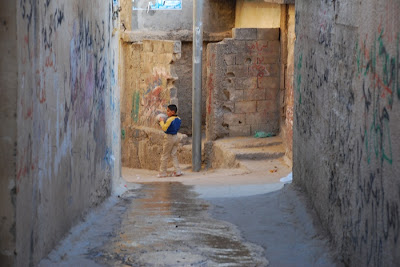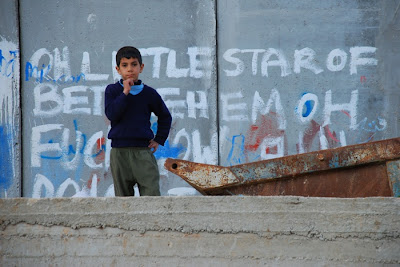It was January 2001. President Bush had just been inaugurated, Ariel Sharon was only days away from becoming Israel’s Prime Minister, and in four months Sting would be giving a fantastic concert under a night sky at the Great Pyramids in Cairo (it really was stunning).
As for me, I was now sitting on the roof in a Palestinian refugee camp, craning my neck to make a quick visual sweep of the narrow street in front of the house.
The refugee camps of the West Bank gave up their tents decades ago, building concrete (and densely populated) homes and evolving into settled communities. I was now on the outskirts of Bethlehem in Dheisheh Camp (pop. 12,800), where a Palestinian was explaining to me and the twenty-one American university students I had brought here how in 1948 the camp’s residents had lost their homes in what is now Israel. “No one can tell us that we have no right to return to our homes,” he told us. “Many of us still have the keys and deeds to our houses.”

Narrow alleys of a refugee camp
Most Palestinian homes, including the one we were now on, have flat roofs. While the students and Palestinian were in the center of the roof, I was sitting near the edge to keep an occasional eye on the street below. At some point I turned toward the street and couldn’t believe my eyes.
There she was, the world’s best journalist: CNN’s Christiane Amanpour.
Every fiber in my being wanted to tear down the stairwell and tell that woman I loved her to death (or at least admired her greatly). I had watched her for most of a decade now, remembering her reports from Rwanda, Bosnia, and other hotspots around the world. I recalled how in 1993 she took then-President Clinton to task for his inaction as Bosnian Muslims were being massacred by Bosnian Serbs. This was the same conflict about which she said, "There are some situations one simply cannot be neutral about, because when you are neutral you are an accomplice. Objectivity doesn't mean treating all sides equally. It means giving each side a hearing." Right on.

Boy in a Bethlehem-area refugee camp
Only days earlier I had received a newspaper clipping from my mom in which Amanpour, who months earlier had given birth to her first child, is asked by an interviewer if having a child had given her second thoughts about going to troubled spots (this trip to Israel/Palestine was her first one since the birth). She replied that it only reinforced her desire to report stories that needed to be told, because she wanted her child to grow up in a world where truth was told and abuse exposed.
Indeed, I wanted to race down the stairs to greet her. But I couldn’t. I was not a lone traveler this week; I was responsible for a study-abroad group. Nor did I want to be rude to our Palestinian host by darting off at the beginning of his heartfelt talk.
Still early on in my enthralled staring, Amanpour looked up and said hello.
“What are you all doing up there?” she yelled.
“Learning about the camp,” I replied.
She smiled and then turned to a Palestinian child who had approached her with a soccer ball. As her camera crew continued to set up for her report, my admiration for her only grew as she began to kick a soccer ball around with several boys. She was not in this job for the money, fame, or adrenaline; she was in it because she cared about people, and because stories need to be told.
And for a moment, we had spoken.
Joel Carillet, chief editor of wanderingeducators.com, is a freelance writer and photographer based in Tennessee. He is the author of 30 Reasons to Travel: Photographs and Reflections from Southeast Asia. To learn more about him, visit www.joelcarillet.com.
